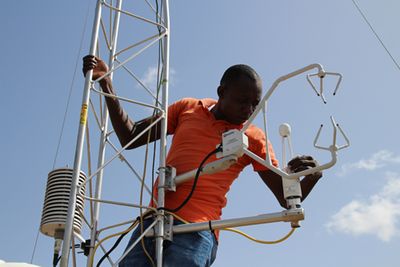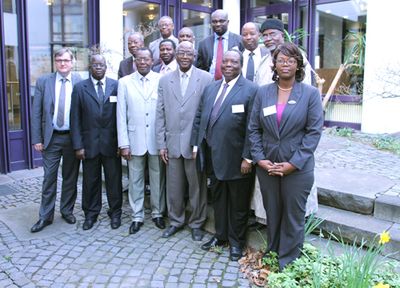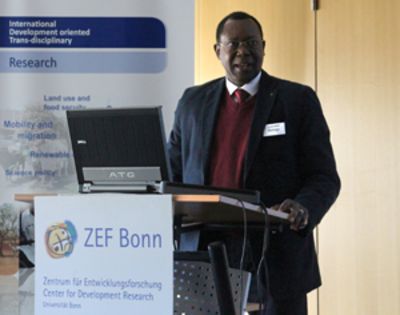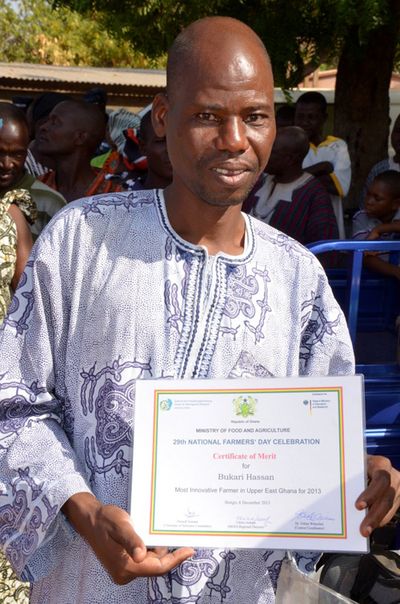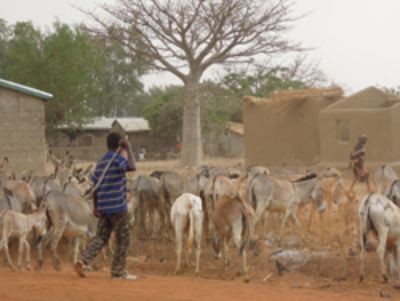In his early career Paul Vlek researched the benefits in preventing nitrogen (N) losses by deep-placement of urea in flooded rice, a technology now applied on over 2 million ha of rice cultivation today. However having experienced the long delay between discovery and adoption of this technology, Paul Vlek drew attention “to the all too often delay between invention of new agricultural practice and adoption which can run into decades. New approaches in agricultural research are needed to avoid such time lapses by engaging and integrating all stakeholders in the innovation process from the onset of research”.
This interdisciplinary research approach has been a hallmark of Paul Vlek’s career working in Africa, Uzbekistan and elsewhere to ensure the research outcomes lead to innovation and adopted new practice. An example was the GLOWA Volta project in West Africa (2000-2010), an interdisciplinary program addressing the impact of global climate change and water management in the region.
The award is presented by the Global Confederation of Higher Education Associations for Agricultural and Life Sciences (GCHERA), with Nanjing Agricultural University (NAU). They established the GCHERA World Agricultural Prize, which was first awarded in 2013, to recognize the contribution of a faculty member from an agricultural and life science university who has significantly contributed to the mission of the university through education, research and knowledge transfer for the benefit of society. This annual award is given for the second time in 2014.
Professor ZHOU Guanghong, the President of Nanjing Agricultural University (NAU), welcomed Paul Vlek to the GCHERA 2014 World Agricultural Prize Award Ceremony on September 20 and John Kennelly, President of GCHERA, announced him as the World Agriculture Prize Laureate 2014 during GCHERA’s Annual Meeting at NAU.
John Kennelly held up Professor Paul Vlek as a most deserving recipient of the World Agriculture Prize based on his outstanding contributions to education, research and service on the sustainable use of natural resources over a career that has spanned 40 years.
“This recognition as an example to others is particularly timely as we face the challenge of reducing the environmental footprint of agriculture while increasing food production to meet the needs of a rapidly growing world population,” he said.
In his acceptance speech Paul Vlek highlighted that “agriculture is a complex socio-ecological endeavour with many trade-offs. To better guide our land-stewards (farmers) and policymakers, the next generation of agricultural scientists must be trained in the modern tools of complexity science and be able to work across disciplines and with multiple partners and stakeholders. “
“Only with such interdisciplinary understanding will the serious threat of land degradation to food security and to the delivery of essential ecosystem services be addressed. The cost of rehabilitation of degraded land, a non-renewable resource, can be prohibitive. The agricultural scientific community must place this concern much higher on its research and educational agendas.”
Christian Borgemeister, Director of ZEF, University of Bonn, welcomed the award recognising Paul Vlek’s distinguished career. A favourite expression of Paul Vlek is “While you are up and about you may as well do the best you can”, is a reflection of his motivation, conviction, dedication, and his leading by example which have made a tremendous impact on people. “The Center ZEF he help to build has become one of the world’s best Science and Technology Think Tanks and is listed among the best university-affiliated Think Tanks.”
“Paul Vlek has implemented research and education projects in South America, West and East Africa and Central Asia. Similar projects often end with the research findings published, but without bringing them to practitioners and policymakers. In contrast, the projects headed by Paul Vlek have ended in a different way by translating innovations into action and introducing development approaches to national agricultural policy-makers and practitioners.”
The Award Ceremony was followed by the 2014 GCHERA International Seminar and World Dialogue on Education and Innovation in Agriculture and Life Sciences, “Fostering Agriculture Innovation Systems Networks through the Linkage of University, Industry, and Government,” September 20-21.
BACKGROUND
The recipient Professor Paul Vlek
Since 1998, Paul Vlek has been the Director of the Center for Development Research (ZEF), which he co-founded, at Bonn University, Germany. He has held a number of senior appointments over his 40-year career both in Germany and overseas including Director of the Agro-Economic Division of the International Fertiliser Development Center (IFDC, USA), Director of the IFDC in Africa, Director of the Institute of Agronomy in the Tropics and Dean of the Faculty Agriculture at the Georg –August-University Göttingen, Germany, and founding Executive Director of West African Science Service Center on Climate Change and Adapted Land Use (WASCAL) in Ghana. In 2011, Paul Vlek was appointed to the UNESCO chair on Education for Sustainable Development at Urgench State University, Uzbekistan.
The World Agriculture Prize
The Global Confederation of Higher Education Associations for Agricultural and Life Sciences (GCHERA), with Nanjing Agricultural University (NAU), established the GCHERA World Agricultural Prize in 2012 to recognise the contribution of a faculty staff member from an agricultural and life science university who has significantly contributed to the mission of the university through education, research and knowledge transfer for the benefit of society. This annual award is given for the second time in 2014. NAU sponsors the prize.
The Global Confederation of Higher Education Associations for Agriculture and Life Sciences
The Global Confederation of Higher Education Associations for Agriculture and Life Sciences (GCHERA) was established in 1998 but in 2011 the governance structure was changed so that instead of individual university membership, its membership is now made up of 13 worldwide higher education associations who themselves represent individual universities in the agricultural and life sciences areas. For example, China is represented by the Education Professional Committee of the Chinese Association of Agricultural Sciences Societies, Europe is represented by the Association for European Life Science Universities, USA is represented by the Association of Public and Land Grant Universities and Canada is represented by the Association of Canadian Faculties of Agriculture and Veterinary Medicine.
The Mission of GCHERA is to encourage and support global co-operation among agricultural and life sciences higher education associations, and their member universities, so as to enhance innovation and leadership in education, research and outreach. GCHERA provides a forum for sharing of best practices as well as being a global voice on some of the most pressing challenges facing the world today. Agricultural and life science universities have a critical role to play in providing the human resources and the research and innovation needed to meet the challenge of feeding a rapidly growing world population whilst reducing the environmental footprint of our food and non food production systems.
For more information, please contact:
Bonn University : Mrs. Alma van der Veen aveen(at)uni-bonn.de
GCHERA: Dr Simon Heath secretariat(at)gchera.com
WASCAL: Ms Jelana Vajen press(at)wascal.org
RELATED LINKS
GCHERA: http://www.gchera.com
Nanjing Agricultural University: http://english.njau.edu.cn/
Center for Development Research (ZEF), University of Bonn: http://www.zef.de/index.php?id=zefhome
GCHERA Nanjing: http://wap.njau.edu.cn/Defaulten.aspx
WASCAL: www.wascal.org


